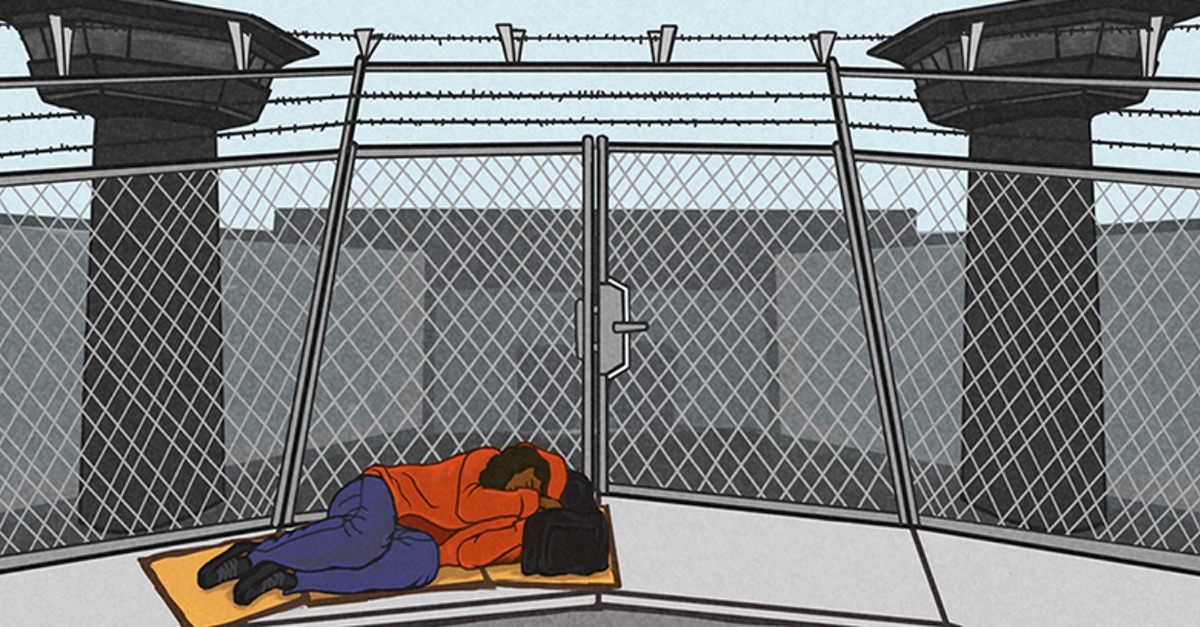
A Review of Research on Modern Homelessness in America and the Role of Incarceration Within This Unethical Cycle
Depiction of an assumed unhoused person sleeping on the sidewalk near the chain linked and barbed wire fence of a prison, flanked on each side by two guard towers.
Kimber Wood ‘24 graduated from Santa Clara University with a double major in political science and dance. Kimber was a 2023-24 Government Ethics Fellow with the Markkula Center for Applied Ethics. Views are her own.
Homelessness in America
Housing, at its core, is a basic human need. We all deserve access to reliable, safe spaces to comfortably shelter and simply live. Anya Daly, researcher of philosophy and ethics, posits that we can only solve homelessness when we see it as our problem Historically, homelessness rates skyrocketed in America during the Great Depression and remained a relevant issue on account of urbanization and deinstitutionalization. With a lack of adequate resources, as well as limited statistics, the housing crisis has remained a persistent issue that demands real attention. Indeed, the lack of affordable housing and increasing mental health issues, as well as ongoing economic inequality, all contribute to the severity of homelessness. One of the most apparent concerns is the glaring lack of coordination between organizations, policymakers, etc. to sufficiently address the problem at hand. These groups individually provide band aid solutions that do not yield lasting results. Furthermore, one must consider how many unhoused behaviors are criminalized, thus incarceration adds another layer to this crisis. Once an individual has entered the system, there is an increased likelihood that this person will experience homelessness for a period of time and/or return to imprisonment.
The Role of Incarceration
Leaving prison is often perceived as an opportunity for freedom and redemption, yet the intense state of vulnerability and instability an individual faces upon re-entry hinders such possibilities. Beyond the processes of repairing personal relationships, maintaining sound mental and physical health, adapting to an independent lifestyle, and for some, following the legal procedures associated with parole, formerly incarcerated individuals must find stable housing and employment to survive. A place to live is a basic human need; but the 2023 Annual Homeless Assessment Report states that over 653,000 Americans were experiencing homelessness, showing a 12 percent increase from 2022. Despite the implementation of rehousing initiatives, those who have experienced incarceration remain at high risk for experiencing homelessness. Housing discrimination remains prevalent as property owners and landlords often implement restrictive deeds that pose barriers to affordable, reliable housing. Significant data gaps and limited statistics affect the ability to provide effective support services. With limited knowledge of who is circulating through jails, hospitals, and shelters, there is less awareness on how to remedy current circumstances that promote both homelessness and recidivism. Through investigating the effectiveness of housing first models and addressing areas of policy reform, we can grow closer to finding more reliable systems for those re-entering American society after incarceration who deserve equitable access to housing and basic needs.
Access to housing is an essential step towards reducing recidivism rates and providing individuals with the means to support themselves. People experiencing homelessness have increased morbidity and mortality compared to those who are housed. A recent study found that the likelihood of death from any cause among homeless individuals in affluent countries is between 3 and 11 times higher than their housed counterparts. This increased mortality rate endures as those of lower socioeconomic status remain subject to poorer health conditions. A separate study discovered that people who experience homelessness die nearly 30 years earlier than the average American.
Raising Awareness and Finding Solutions
Many assume that the core issue of homelessness lies after imprisonment for those who have been incarcerated, more specifically concerns regarding a lack of resources upon re-entry. Although this remains a valid and pertinent concern, the initial problem is the overenforcement and criminalization of homelessness itself. Assistant Professor in Human Geography at Oxford University, Dr. Jessie Speer, notes that many state legislators implement high levels of policing with intentions of promoting public safety and the feeling of security in the U.S. This action may be counterproductive as excessive criminalization does not lessen crime rates or increase public safety. On the contrary, such efforts often worsen the stability of families and communities, as well as serve as a major financial burden on the state. Intense policing also erodes trust between law enforcement and homeless populations. This tainted relationship means that unhoused individuals are less likely to seek aid or be connected to support services that have the potential to help their current situations. Such social dynamics can create an unfair hierarchy contributing to the lack of cooperation on both ends, with little respect shown by police officers towards those facing risks of incarceration on account of homelessness.
It is also important to note that criminalizing homelessness disproportionately targets people of color, LGBTQ+ individuals, and those with disabilities. In the city of Chicago, research suggests that the relationship between health status and reentry outcomes differ by gender, showing that women tend to experience poorer outcomes than men regardless of their health status. For instance, more women in 2016 faced housing insecurity in Chicago than men upon reentry from jail or prison. Timothy Imeokparia with the University of Illinois at Chicago found, “1,200 individuals are released directly from prison to homeless shelters in Chicago annually, while as many as 48 percent of individuals in Chicago emergency shelters report having a felony conviction” . Although these numbers may not appear substantial, this case study acknowledges that concerns of anonymity and general stigma influence people’s responses and the overall reports in Chicago alone. Chicagoans of color are more susceptible to police surveillance, suspicion, and intervention than white citizens; additionally, many independent court cases reveal the evident racial discrimination in the Chicago court system as it places harsher penalties on crimes committed by people of color.
Not only does the prevalence of discrimination concern the ethical status of the cycle of incarceration and homelessness, but the existence of homelessness itself poses ethical concerns. Manuel Velasquez and fellow scholars acknowledge the significance of questioning the morality of current events. Although philosophers have developed five main approaches to analyzing ethical dilemmas, two in particular stand out when questioning the moral obligation we hold to combat the current stigmatization and discrimination surrounding homelessness. Through focusing on both the Rights Lens and the Cares Lens, we can question how the nation’s current approach to solving homelessness is falling short. The rights approach establishes that actions are considered wrong based on the severity of the human rights violation. Therefore, if an action fails to respect another person’s dignity, this action is wrong. Jonathan Kwan defines care ethics as recognizing relationships and the fact that humans depend on one another. He notes that our emotions and our bodies must be considered while partaking in ethical reasoning. Indeed, allowing homeless populations to live and die without any form of proper aid is highly unethical and disregards meeting the basic needs of countless human beings. Although there are organizations supporting those experiencing homelessness, the government must take actions to provide effective legislation that yields long-term results by utilizing these ethical frameworks.
Policy Making and Political Action
That being said, the U.S. government has taken steps in certain areas to provide financial support to its citizens. The Department of Housing and Urban Development implemented the McKinney-Vento Homeless Assistance Grants program which provides funding to communities to provide housing services at the local level. Such grants have supported millions of individuals facing housing insecurity; that being said, this funding does not reach all vulnerable populations across the country equally. Dating back to 2008, the Second Chance Act was designed to support state governments and nonprofit organizations in their efforts to decrease recidivism and improve reentry services. Although there are success stories from this legislation, the lack of sufficient funding and overall coordination has limited the efficacy of such programs.
Many state lawmakers have increased policing and anti-poverty laws, which in turn increase homelessness and incarceration. Minor offenses, such as resting in public spaces or soliciting money, often serve as the initial step towards an unhoused person being in and out of the criminal justice system. Due to the higher levels of policing in low income neighborhoods, inhabitants of these communities are less likely to afford high bail amounts or adequate legal resources. As a result, such individuals are subject to facing harsher sentencing. Federal and local restrictions that prevent formerly incarcerated people’s access to federally subsidized housing have become more stringent in recent years with the implementation of one strike policies. These laws bar individuals who have been evicted for drug or criminal involvement from access to housing. One strike policies also expand discretion and grant local housing authorities to evict tenants and restrict access to subsidies on account of a criminal record. Studies from 2019 found that over half of people experiencing homelessness in the U.S. have been previously incarcerated. Therefore, the evident connection between incarceration and homelessness must be addressed with legislative action that prioritizes support services as opposed to increased punishment or band-aid funding to support fewer unhoused Americans.
As noted previously, the Rights Lens of ethical decision-making allows us to consider how actions respect or disrespect the basic rights of the individuals involved. By implementing legislation that directly disregards the humanity of unhoused populations, these lawmakers are undermining the basic rights of many citizens who are already in vulnerable positions. Such ethical concerns exist beyond housing policies. The entire day-to-day lived experiences of the unhoused represent the ongoing cycles of marginalization that persist in modern society. As Kwan encouraged us to consider the care for one’s emotional and physical well being, we have to raise awareness on the inhumane living standards that have become normalized for those without a permanent home. Although there are leaders and lawmakers taking action to end this systemic problem, stigma remains at the forefront of homelessness. Tackling this issue requires a comprehensive approach to reverse current oppressive norms of our society and implement supportive legislation that acknowledges the reality that all human beings have a right to stable, affordable housing.
Housing First and More Solutions
In addition to addressing rehousing on a case-by-case basis, Housing First approaches to rehousing effectively reduce recidivism and promote stable employment opportunities and self-sufficiency. Housing First prioritizes providing immediate housing to unhoused individuals to promote self growth and self sufficiency. Housing is a fundamental human right as well as an integral part of one’s ability to maintain a stable lifestyle. Meeting the basic needs of housing through this approach, an individual is also more likely to participate in rehabilitation and support services on account of the security of a safe space to live. The permanence of a home creates a platform to work towards long-term stability. LeBel’s analysis states the cost-effectiveness of Housing First, as this approach minimizes the utilization of emergency services and its long-term implementation should decrease the immense costs of maintaining jails and prisons. The 2014 Annual Homeless Assessment Report tracked 37 individuals experiencing homelessness in Osceola County, Florida who were arrested 1,250 times over the course of ten years. This totaled 61,896 total days of incarceration, equating to a sum cost of $6, 417, 905. Incarceration and homelessness foster dehumanization and stigmatization, thus Housing First can effectively humanize formerly incarcerated people and support their self perception.
In addition to Housing First, implementing "ban the box" policies at the federal level for housing applications would be instrumental in providing individuals with criminal records fair access to stable housing, removing barriers to reentry, and reducing the risk of homelessness upon release. Secondly, increased funding and coordination of housing programs utilizing Housing First models are crucial. These programs will significantly reduce the large costs associated with incarceration and the current fragmented approach to rehousing in America. Ensuring access to support services, such as counseling and substance abuse recovery, will also minimize the likelihood of recidivism or homelessness. Collaboration is essential for promoting successful rehousing efforts. Government agencies, housing authorities, social service providers, and involved organizations can improve efficiency through communicating with one another to provide equal access to sustainable housing. It would also be meaningful to implement an integrated database tracking system. With this program, caseworkers and policymakers will gain a better understanding of the problems at hand and most importantly, how to provide lasting solutions to those facing barriers to reentry.
In conclusion, the issue of homelessness in America remains a serious ethical concern for the nation. Housing, as a fundamental human right, remains a hardship for far too many individuals who already face discrimination through housing policies, economic inequality, and insufficient support services. Furthermore, the cyclical nature of incarceration and homelessness contributes to discrimination, as minorities are more highly policed and vulnerable to imprisonment. Efforts such as Housing First initiatives have provided a sense of hope for sustainable solutions. Housing serves as the stepping stone and reliable foundation for skills of self-sufficiency and personal growth. We all have the ability to raise awareness and support efforts towards effective rehousing. Policymakers must also implement laws promoting equal access to housing and support services. With consistent collaboration and the prioritization of Housing First, there is hope for long term progress towards finding every human being a safe space to call home.
Works Cited
Atkinson, Daryl. Lockwood, Kathleen. “The Benefits of Ban the Box: A Case Study of Durham, NC”. The Southern Coalition for Social Justice. 2016.
Baxter, Andrew et al. “Effects of Housing First approaches on health and well-being of adults who are homeless or at risk of homelessness: systematic review and meta-analysis of randomised controlled trials.” Journal of epidemiology and community health vol. 73,5 (2019): 379-387. doi:10.1136/jech-2018-210981.
Bryan, Brielle. “Housing Instability Following Felony Conviction and Incarceration: Disentangling Being Marked from Being Locked up - Journal of Quantitative Criminology.” SpringerLink, Springer US, 25 June 2022, link.springer.com/article/10.1007/s10940-022-09550-z.
Couloute, Lucius, and Daniel Kopf. Out of Prison & Out of Work: Unemployment among Formerly Incarcerated People. Prison Policy Initiative, 2018. JSTOR, http://www.jstor.org/stable/resrep27307.
Daly, Anya. Merleau-Ponty and the ethics of Intersubjectivity. Palgrave Macmillan. 2016.
Gill, Monique, et al. “Housing and Reentry: A Mixed-Method Evaluation of a Low-Cost Community-Based Intervention for Increasing Access to Housing Post-Incarceration.” Journal for Advancing Justice, Corporate Media Solutions, February 2022, www.morgan.edu/Documents/ACADEMIA/SCHOOLS/SSW/Journal-for-Advancing-Justice-Volume-IV_final.pdf#page=63.
Kwan, Jonathan. “Care Ethics.” Markkula Center for Applied Ethics at Santa Clara University. May 2023. https://www.scu.edu/ethics/ethics-resources/ethical-decision-making/care-ethics/care-ethics.html.
LeBel, Thomas P. "Housing as the Tip of the Iceberg in Successfully Navigating Prisoner Reentry." August 2017.
Velasquez, Manuel; Andre, Claire; Shanks, Thomas S.J.; & Meyer, Michael J."Thinking Ethically.” Vol. 3, no. 1, Winter 1990. https://www.csulb.edu/sites/default/files/document/reading_resources-touch_and_consent.pdf.
Orians, Kelly Elizabeth. “‘I’ll Say I’m Home, I Won’t Say I’m Free’. Persistent Barriers to Housing, Employment, and Financial Security for Formerly Incarcerated People in Low-Income Communities of Color.” eScholarship, National Black Law Journal. 2016. escholarship.org/uc/item/2219801g.
Patrick, Anna. “HUD reports record-high homeless count in 2023 for U.S., WA”. The Seattle Times. December 19, 2023. https://www.seattletimes.com/seattle-news/homeless/hud-reports-record-high-homeless-count-in-2023-for-u-s-wa/
Serrato, Jacqueline; Sier, Pat; Runes, Charmaine. “Mapping Chicago’s Racial Segregation”. South Side Weekly. 2018. https://interactive.wttw.com/firsthand/segregation/mapping-chicago-racial-segregation.
Speer, Jesse. “The Rise of the Tent Ward: Homeless Camps in the Era of Mass Incarceration.” Science Direct. Political Geography, Volume 62. January 2018. https://doi.org/10.1016/j.polgeo.2017.11.005.


